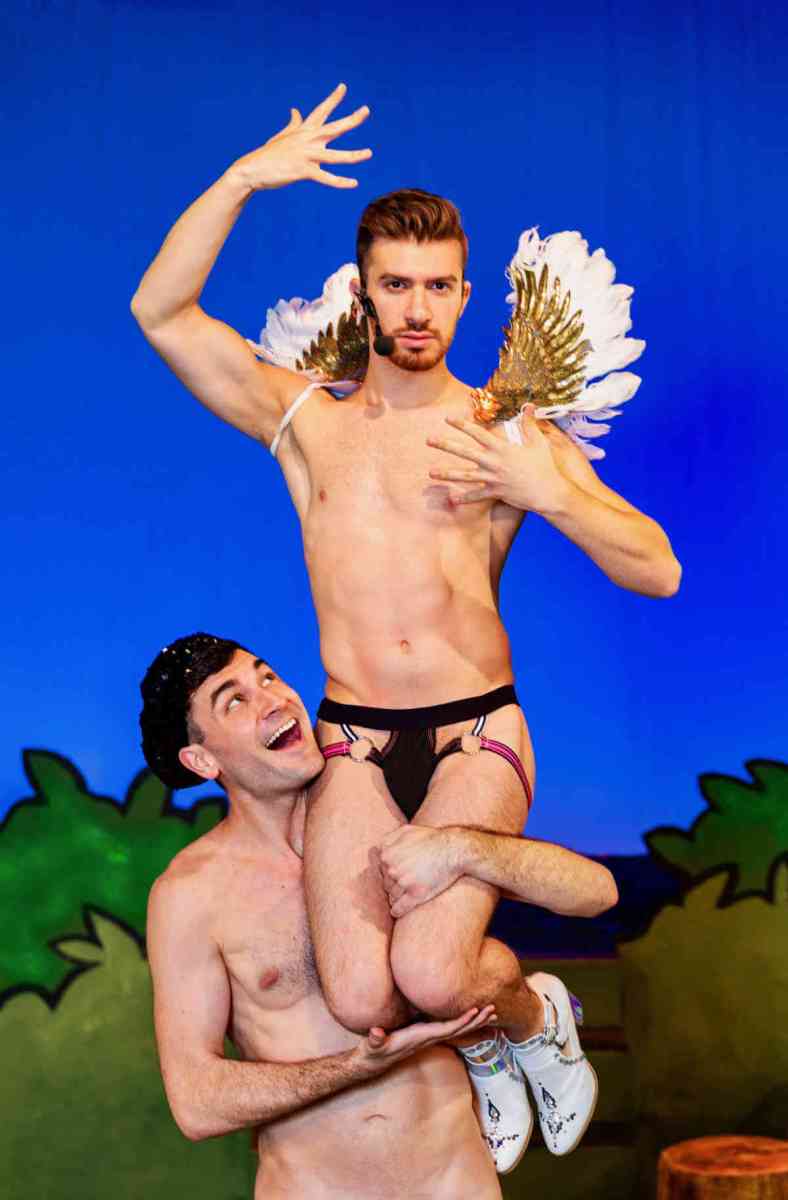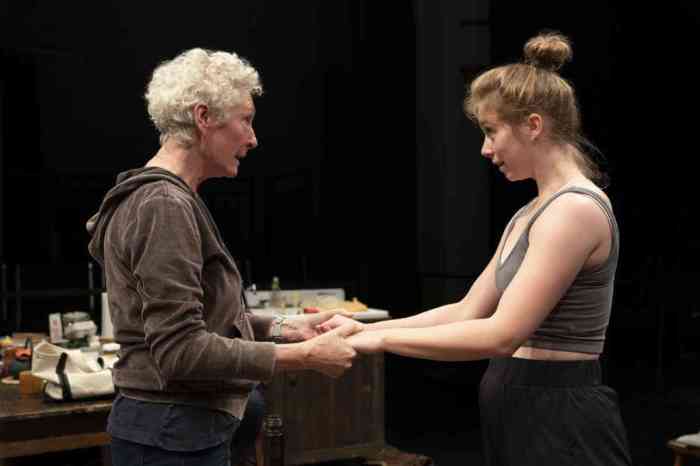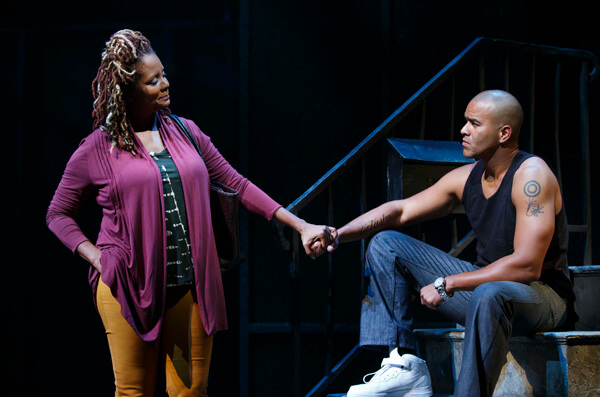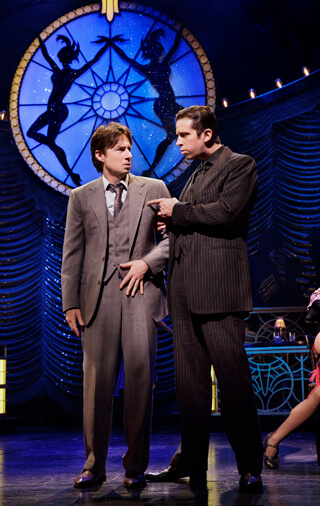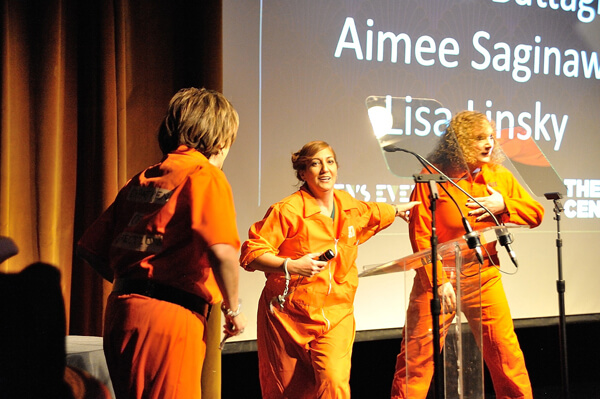To approach an Off-Broadway musical like “Camp Morning Wood: A Very Naked Musical” with anything approximating serious criticism is a fool’s errand. This slight, superficial musical trades on silliness and nudity in a quasi-campy effort to entertain. That much it achieves. The flaccid plot centers on a camp where people are free to be themselves. When a gay but nearly heteronormative couple stumble on the camp after getting a flat tire, they are drawn into this world that challenges their idea of what their relationship should be.
In fact, Randy and Gabe are in conflict about what it means to be in a gay relationship. Should it be open? Should they really be getting married? And on and on.
Meanwhile, the camp could be shut down so a craven politician can create a combination megachurch and oil refinery.
This is all really just a framework for a revue as the different denizens of the camp strut their stuff.
The creators — Jay Falzone (book and lyrics) and five songwriters (Bobby Cronin, Will Shishmanian, Matt Gumley, James Dobinson, and Derrick Byars) with concept and direction by Marc Eardley — do deserve credit for creating characters of many different body types, promoting a body- and sex-positive point of view, and skewering, however bluntly, the hypocrisy of anti-gay people. Though it’s not particularly original, the fact that — spoiler alert — the perfect-bodied twink turns out to be the villain of the piece is funny, but, like so much of this, it feels forced. The problem with the nudity is that it serves no real dramatic purpose. There’s nothing particularly daring or even titillating about it, nor does it have the irony of “Naked Boys Singing.”
The company is charming, energetic, and talented. In the end, though, this is reminiscent of a kind of Off-Broadway musical that was popular in the 1980s. It’s intended for — and largely panders to — a very specific audience. It’s a mindless romp intended to be nothing more than a good time with the nudity as a gimmick. If that’s your thing: go for it.
There’s good news for Shakespeare fans. Kenny Leon’s recent staging of “Much Ado About Nothing” in Central Park has been filmed for PBS’s “Great Performances.” The potential audience will be numbered in the millions, rather than the thousands who thronged to the Delacorte for this exuberant, romantic production.
“Much Ado” is one of Shakespeare’s most often-produced comedies, and there have been many interpretations of the battling Beatrice and Benedick who, though they ostensibly loathe one another, are brought “into a mountain of affection th’ one with th’ other” by their friends. Set in a brief pause between wars when the soldiers are billeted at the estate of Leonato, uncle to Beatrice, she and Benedick resume their taunting relationship. At the same time, Leonato’s daughter Hero falls in love with a young solider Claudio, only to have their nuptials almost ruined by false reports that Hero is not chaste.
The rocky road to romance and spirited sparring are what make the play, particularly when complemented by the foolishness that love revealed creates. It’s classic comedy, to be sure, but what makes Leon’s production work so well is the youthful production. With an all-black cast and a contemporary attitude, this is a tale set firmly in the here-and-now. Or, rather, in the near future.
Beowulf Boritt’s inspired McMansion set prominently features a “Stacey Abrams 2020” banner. The punking of Beatrice and Benedick and the near devastation of Hero by plotting and gossip believably exist in a world dominated by social media. Leon, though, uses these elements deftly, never allowing the concept to overwhelm Shakespeare’s language. It’s joyful, poignant, and lyrical. Even the comics, the constable Dogberry and his bumbling crew, who discover the plot against Hero, are both firmly of Shakespeare’s time and our own.
The cast is nothing short of splendid. Danielle Brooks from “Orange is the New Black” is a winning comedienne with spot-on timing, and she also plays the romance with vulnerability and feeling that provide insight into Beatrice’s more complex character. Similarly, Grantham Coleman as Benedick plays the dichotomy between pointed jibing and besotted lover brilliantly. Though the characters or Hero and Claudio are more straightforward, Margaret Odette and Jeremie Harris are wonderful in the roles. Lateefah Holder plays Dogberry who, despite the hilarious malapropisms, is a strong woman with an unshakeable moral center. It’s an interpretation that gives the character more depth than in most productions.
One of the most telling — and moving — elements of Leon’s direction is the reminder at the end that as wonderful as they are, the happy romance is just a pause in the workings of the worried world. Even at the height of celebration, the soldiers are called back to the wars. But it’s hopeful, too, because whatever lies ahead, the belief is that love wins.
One hopes that memorializing and broadcasting this production will expose a new, younger audience to the romance and relevance of Shakespeare. As Beatrice herself says, “I believe it better than reportingly.”
CAMP MORNING WOOD | Peter Jay Sharp Theater, 416 W. 42nd St. | Jul. 5 at 7:30 p.m., Jul. 6-7 at 5:30 p.m. | $39-$99 at ticketcentral.com or 212-279-4200 | One hr., 40 mins, with intermission


